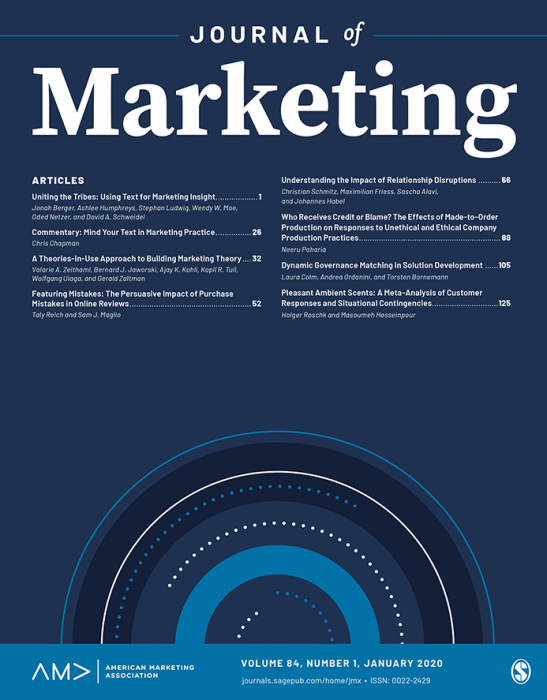快讯:企业对投资者 (B2I) 营销:有成本和无成本信号的相互作用
IF 10.4
1区 管理学
Q1 BUSINESS
引用次数: 0
摘要
面向投资者的营销(尤其是在为初创企业寻求资金时)是独一无二的,因为投资者面临着极大的不确定性。本研究利用市场营销、经济学、管理学、金融学和心理学的基础研究成果,以及与天使投资人和风险投资人共同开发的在用理论,构建了企业对投资人(B2I)营销理论。该理论认为,无论是有成本的(财务、社会、人力和智力资源禀赋)还是无成本的(语言激情和具体性)营销信号,投资者都依赖于来自初创企业的营销信号。一项对 5334 份初创企业书面建议书进行的大型实地定量研究结果表明,有成本和无成本信号对投资者的接受度具有交互影响。创业者的自然倾向是用充满激情的语言来弥补有成本信号的不足,结果适得其反,降低了投资者的接受度。只有在传递了大量代价高昂的信号时,更多使用激情语言才会提高投资者的接受度。此外,当缺乏成本信号时,书面建议应适度具体;当可以提供大量成本信号时,书面建议应抽象化。这些意外情况为 B2I 营销中的有成本-无成本信号相互依存关系提供了启示,并建议初创企业如何优化其书面建议以获得投资者的认可。本文章由计算机程序翻译,如有差异,请以英文原文为准。
EXPRESS: Business-to-Investor (B2I) Marketing: The Interplay of Costly and Costless Signals
Marketing to investors – especially when seeking funding for start-ups – is unique, with investors facing extreme uncertainty. This study uses foundational work in marketing, economics, management, finance, and psychology, as well as theories-in-use development with angel and VC investors to build a Business-to-Investor (B2I) Marketing theory. The theory proposes that investors rely on marketing signals from start-ups’ whether they are costly (financial, social, human, and intellectual resource endowments) or costless (verbal passion and concreteness). Results of a large quantitative field study of 5,334 written proposals from start-ups show that costly and costless signals have interactive effects on investor acceptance. The natural entrepreneurial tendency to compensate for a lack of costly signals with the use of passionate language backfires, reducing investor acceptance. Only when there is a number of costly signals communicated does a greater use of passion increase investor acceptance. Further, written proposals should be moderately concrete when they lack costly signals and should be formulated abstractly when plenty of costly signals can be offered. These contingencies provide insights into costly-costless signal interdependence in B2I marketing and suggest how start-ups can optimize their written proposals for investor acceptance.
求助全文
通过发布文献求助,成功后即可免费获取论文全文。
去求助
来源期刊

Journal of Marketing
BUSINESS-
CiteScore
24.10
自引率
5.40%
发文量
49
期刊介绍:
Founded in 1936,the Journal of Marketing (JM) serves as a premier outlet for substantive research in marketing. JM is dedicated to developing and disseminating knowledge about real-world marketing questions, catering to scholars, educators, managers, policy makers, consumers, and other global societal stakeholders. Over the years,JM has played a crucial role in shaping the content and boundaries of the marketing discipline.
 求助内容:
求助内容: 应助结果提醒方式:
应助结果提醒方式:


